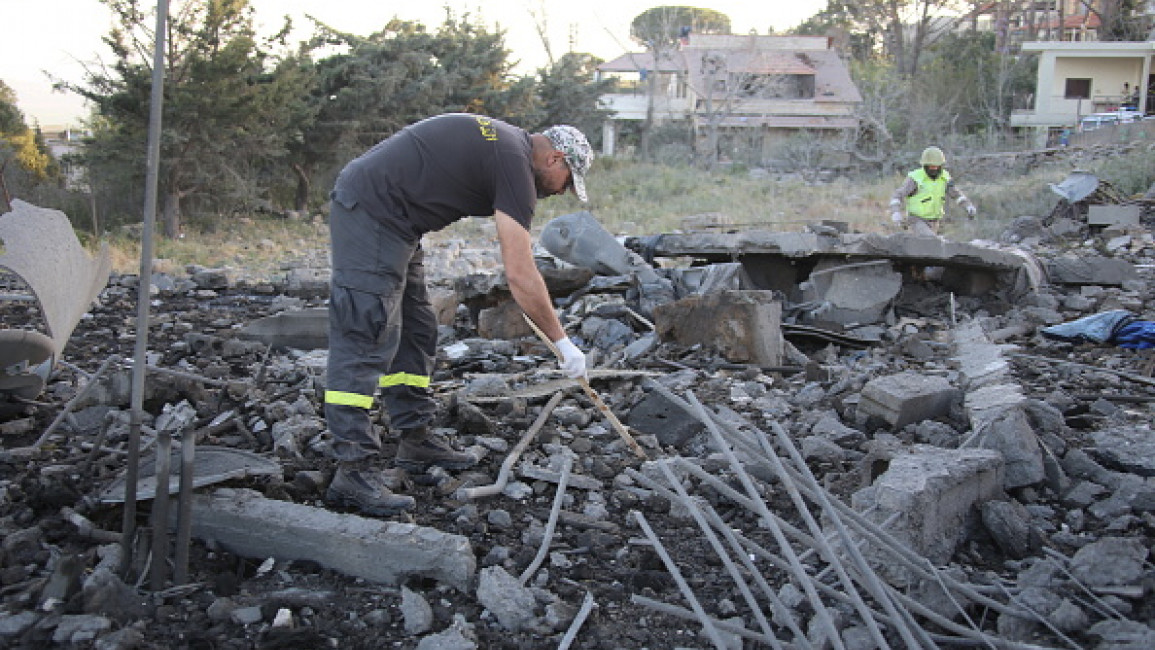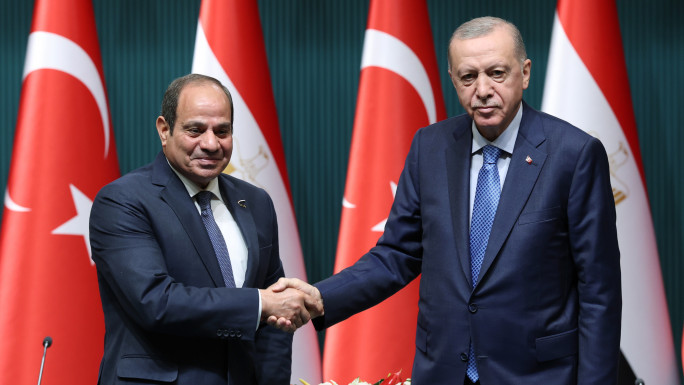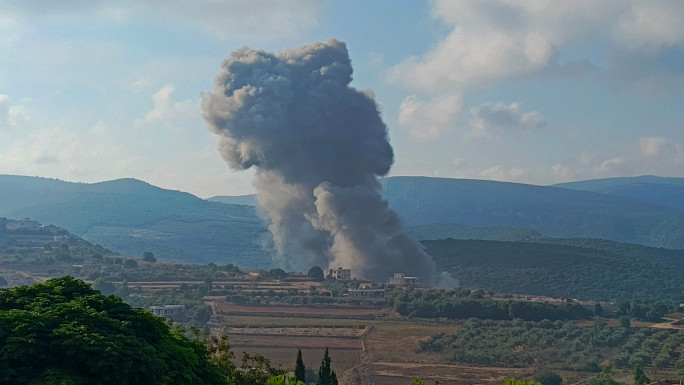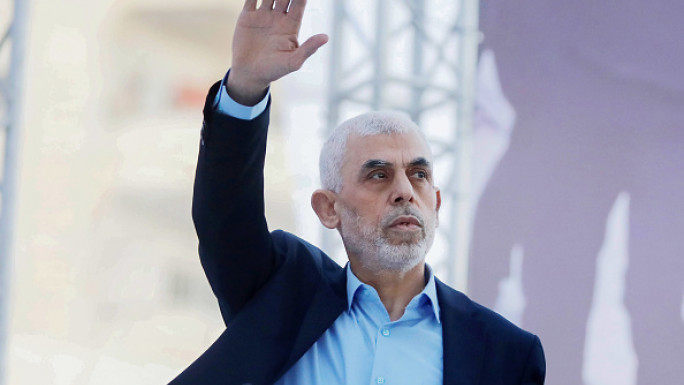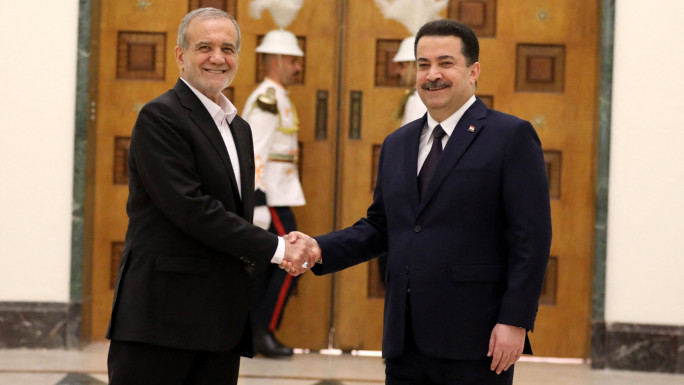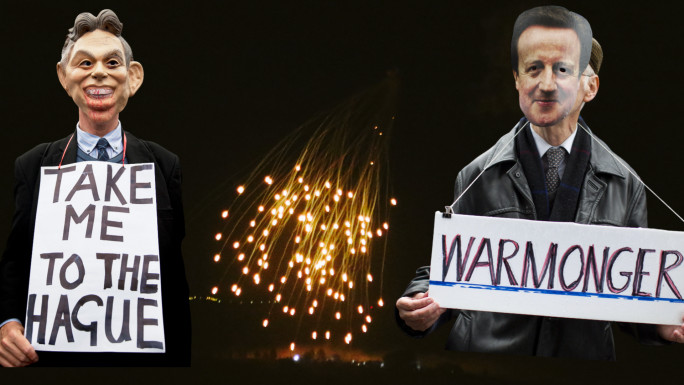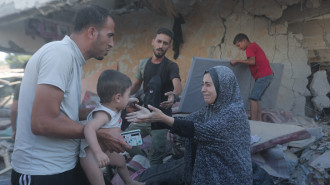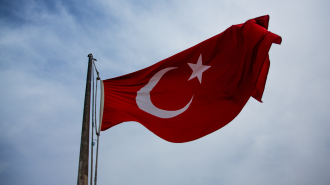Amid sectarian challenges and an economic crisis, Lebanon Red Cross prepares for wider war with Israel
As Lebanon's Red Cross (LRC) has looked to step up relief efforts in Lebanon's south, where near-daily clashes between Hezbollah and Israel threaten to erupt into all-out war, its humanitarian relief work is being complicated by the country's sectarian divisions, analysts and observers say.
The LRC is the country's top emergency services provider. It runs Lebanon's only 24-hour emergency hotline, and its fleet of ambulances have greater reach than any other. Its famous oath of neutrality has for decades allowed it to criss-cross the country's explosive sectarian lines, delivering relief through decades of civil war and conflict. Its EMS volunteers are so efficient that, in 1990, the Lebanese ministry of health opted to invest in the LRC's ambulance services, rather than build up its own.
When asked by The New Arab about its relief work in southern Lebanon, the LRC has currently "eleven centres, each with about seven vehicles" and that some were located about 5–10 kilometres from conflict zones in southern towns like Rmaych, Tyre, Jensnaya and Jezzine, according to Qassem Shaalan, a Red Cross official who oversees its Disaster Risk Reduction Unit. Shalaan said the LRC is also conducting intensive blood donation campaigns.
But analysts said that brewing conflict between Hezbollah and Israel in southern Lebanon has posed an unusually tough challenge to LRC operations, however above the fray of politics the aid group may be.
Since the US designates Hezbollah as a "terrorist organisation", according to Makram Rabah, a professor of history at the American University of Beirut, this means the LRC, which relies on international donors to fund its work, must tread carefully so it doesn't appear to be working too closely with the Shia armed group. Because of that, it appears to be taking a back seat, with other local groups like Hezbollah's relief agency taking on more of the burden
Rabah pointed out that while the LRC is the country's best equipped agency to lead relief efforts and is normally out in front, "other civil society groups affiliated to parties are more present" in the south, even though that is where its emergency services are desperately needed.
"Like elsewhere around the world, there are other civil society groups that also operate ambulances, but they are not as efficient as LRC, simply because LRC is pan-sectarian and has credibility," said Rabah.
Conflict-prone Lebanon is a patchwork of sectarian groups. Positions of power are legally distributed by religious affiliation. Citizens often turn to their Sunni, Shia, Druze, or Christian leaders for essential services and jobs. NGOs and aid groups like the Red Cross fill in other critical gaps.
Since October, the Israel-Lebanon border has been the theatre of a low simmering conflict in response to Israel's war on Gaza. While modest compared to the total destruction of Gaza, the cumulative damage is still extensive: Israeli airstrikes and shelling have destroyed homes, ruined agricultural land, and scattered southern Lebanon’s population. The UN estimates that over 100,000 people have been displaced, and that 532 have been killed and hundreds more injured.
Lebanon is worried the war could enter a deadlier new chapter. The region has been on a knife edge since Israel struck down Hezbollah commander Fuad Shukr in a Beirut suburb on 30 July, a day before Hamas leader Ismail Haniyeh, and the head of the Palestinian negotiating team, was assassinated in Tehran. Iran and Hezbollah have vowed to strike back, raising fears of a wider regional conflict.
Unlike in Israel, where the state books hotel rooms for the displaced for a limited time, cash-strapped Lebanon has little official capacity to support its war-rattled population. That makes relief efforts by groups like LRC all the more essential.
With the LRC less present than usual, other aid groups have taken the brunt of Israeli strikes in Lebanon's south.
Hezbollah's Islamic Health Authority lost seven ambulance workers in three attacks, while another seven were killed from Al-Isaaf al-Shaabi in Bekaa. On 4 August, a paramedic from the Al-Risala Scout Association was killed and on 9 August, one of their vehicles was targeted, but the paramedics miraculously survived.
"The Geneva Conventions stipulate the protection and immunity of medical teams operating in the field. However, there have been violations, as has happened since the start of the conflict in the south," said Shaalan.
For its part, Beirut's government is doing what it can: in the past eight months, the health ministry has trained up more than six thousand healthcare workers in anticipation of all sorts of emergency scenarios, said Hisham Fawaz, the head of the department of hospitals and dispensaries at the Lebanese of Ministry of Public Health.
"Hospitals have been provided with assistance, like 150 tons of medical supplies," said Fawaz. The ministry has beefed up hospital capacity to receive emergency cases, and a special hotline has been set up "to meet the needs of displaced people in the event of an escalation," Fawaz added.
Moreover, years of economic crisis aren't making the circumstances easy. "Most of the vehicles are outdated and require constant maintenance," said Civil Defence Director General Raymond Khattar.
Elsewhere around the country, crisis cells and local committees have been gathering to coordinate tactics should war erupt. In Mount Lebanon, an emergency care centre to deliver babies and a food kitchen was set up, and a field hospital is next, said Executive Director of the Shouf Development Association Rowaida Dakdouki.
Meanwhile, all eyes are peeled and waiting to see what will happen in the coming weeks.
This piece was published in collaboration with Egab.
